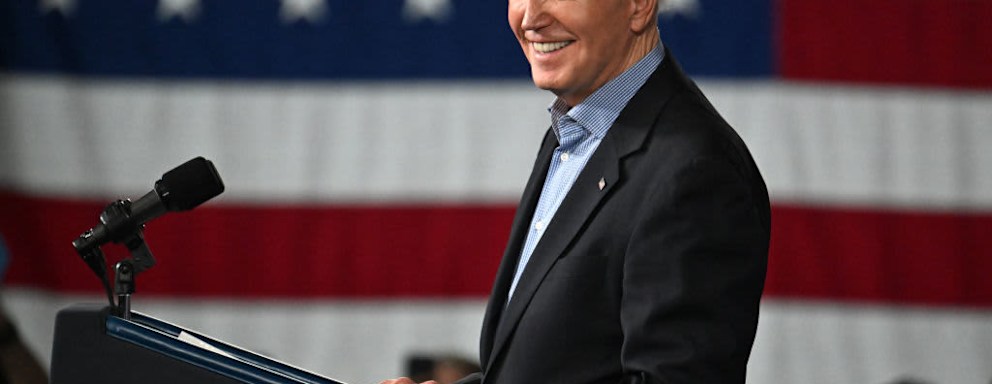Biden Budget Proposes Pell Grant Increase, More Money for HBCUs
 Credit: Image Credit: JIM WATSON / Contributor / AFP / Getty Images
Credit: Image Credit: JIM WATSON / Contributor / AFP / Getty Images- President Joe Biden’s proposal calls on Congress to increase the maximum Pell Grant award by $750.
- That Pell Grant increase would not apply to students attending for-profit institutions.
- Biden’s proposal includes two years of tuition-free learning for some students at minority-serving institutions.
- Minority-serving institutions would see a funding increase of $93 million compared to 2023.
President Joe Biden is pushing for continued investment in college affordability and access, but to a lesser extent than in past years.
Biden released his budget proposal for fiscal year 2025 on Monday. While his higher education priorities like college affordability and support for minority-serving institutions (MSIs) seemingly remain unchanged from past years, his budget notably dials back the sticker price of many of his priorities.
He requested a $750 increase to the maximum Pell Grant, which would bring the maximum award to $8,145 annually.
For reference, he called for a $820 increase in his fiscal year 2024 budget proposal.
Still, a $750 increase would be helpful for many of the 7 million students who utilize Pell Grants to attend college each year. It may also help keep Biden on track to meet his goal of doubling the maximum Pell Grant from 2023-2029, but it’s worth remembering that the federal government has yet to pass a 2024 budget with a Pell Grant increase.
This comes soon after the Committee for a Responsible Federal Budget predicted that the federal government would exhaust Pell Grant reserves by 2026 or sooner.
Biden’s budget also continues his push to increase funding for historically Black colleges and universities (HBCUs), other MSIs, and community colleges. His latest proposal would increase funding for these institutions by $93 million above 2023 levels; which is $329 million higher than 2021 levels agreed upon before he took office. It also included $100 million for four-year MSIs to expand research and development infrastructure.
These asks are also much less than Biden’s past proposals. His 2024 budget asked Congress to increase funding to these institutions by $429 million compared to 2023 levels, compared to just a $93 million increase now.
His latest budget proposal again pushes for two years of tuition-free college for students from families earning less than $125,000 per year if they attend an HBCU, tribally controlled college and university (TCCU), or MSI. He proposed the same plan last year, but continued roadblocks in passing a federal budget have brought those plans to a standstill.
Biden’s past plans for free community college for all have also taken a back seat.
His 2025 budget proposal does include language about expanding free community college through a federal-state partnership.
The budget does not, however, include any details about how such a partnership would work. It does predict that free community college would cost $531 million in 2026 and $90 billion over the next decade.
Additional Affordability Ideas
Biden’s proposed budget would create the Reducing the Costs of College Fund.
This new program, expected to cost $12 billion, would fund three strategies to lower the cost of higher education for students. Those strategies include:
- Competitive awards for public institutions that
affordably deliver a quality education
- The Classroom to Career fund to provide $7 billion to states to improve their dual enrollment offerings and access
- Support for evidence-based college completion programs that lower the costs per graduate at institutions
Competitive grants awarded to colleges and universities could be used to serve more students or share best practices with other institutions, according to the budget proposal.
For-Profit Industry Left Out of Pell Expansion
Biden’s proposed $750 increase to the maximum Pell Grant would not apply to students attending for-profit colleges and universities. The budget says these institutions should be excluded due to evidence these institutions are least likely to provide good outcomes for students.
Career Education Colleges and Universities (CECU), the leading advocacy arm for for-profit colleges, condemned this part of the proposal.
It is disappointing that the Biden administration has decided to penalize students attending for-profit colleges by excluding them from the Pell Grant increase proposed in the 2025 budget,
CECU President and CEO Jason Altmire said in a statement. Underserved students deserve equal access to Pell Grants and should be able to utilize them at the institutions that align best with their personal circumstances and educational goals.
This is not the first time Biden has proposed a Pell Grant expansion that excluded for-profit colleges.
Biden’s Build Back Better proposal from 2021 originally held a similar exclusion for students at for-profit institutions. That language was condemned by some advocacy groups and Democratic lawmakers and was eventually removed from any future budget proposals.
The 2025 proposal marks the first time Biden has resurfaced this exclusion since 2021.